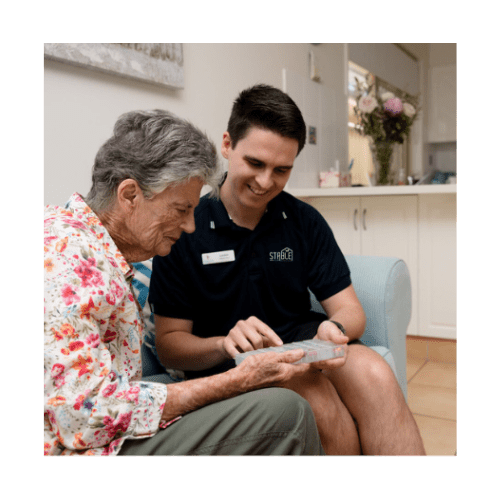The Expanding Demand for In Home Care Givers: Factors Households Select Expert Treatment Over Traditional Facilities
The boosting preference for in-home caretakers over standard centers is a considerable trend reshaping the landscape of older care. Family members are attracted to the benefits of customized care that aligns with private demands and choices, allowing elders to preserve a feeling of autonomy in a familiar atmosphere.
Personalization of Care
Customization of care in home caregiving is necessary for meeting the special demands of each person (home care providers). This technique guarantees that treatment plans are customized to the details requirements of the person, considering their medical background, personal choices, and lifestyle. By concentrating on the person's unique situations, caretakers can promote a sense of self-respect and autonomy, which is commonly doing not have in more institutionalized setups

Home caregiving allows for continuous observation and adjustment of care techniques, making sure that adjustments in wellness standing or individual choices are without delay resolved. Inevitably, individualized treatment in home setups dramatically adds to the total wellness of clients, making it a crucial component of modern-day caregiving techniques.
Convenience of Home Setting
The comfort of a home setting plays a critical function in the efficiency of home caregiving. Numerous people, specifically senior citizens, experience heightened stress and anxiety and anxiousness when put in unfamiliar setups such as standard care centers.
Additionally, the home atmosphere permits a customized technique to caregiving, fitting individual choices and routines. Family members can create an environment that reflects their liked one's lifestyle, making sure that care is provided in a manner that really feels comfy and natural. This individualized setting motivates far better communication and interaction in between customers and caretakers, promoting depend on and connection vital for efficient treatment.
Furthermore, the comfort of home can promote social connections, as member of the family and buddies can check out extra easily, offering vital psychological support. ndis plan manager. Overall, the home environment not only assists to preserve self-respect and freedom yet additionally adds to a higher quality of care, making it a preferred choice for families seeking expert caregiving services

Enhanced Independence for Seniors
Home caregiving not only provides convenience yet additionally advertises boosted freedom for elders. Unlike typical centers, at home treatment enables seniors to maintain their day-to-day routines and engage in acquainted tasks within their very own atmosphere. This autonomy is crucial for their emotional wellness and general lifestyle.

In addition, at home caregivers can adapt their services to cater specifically to the one-of-a-kind demands of each elderly, promoting a higher sense of control. This flexibility guarantees that senior citizens can enjoy their pastimes, interact socially with friends and family, and continue to be active in their areas, even more improving their sense of independence.
Ultimately, in-home caregiving not only attends to the physical needs of elders yet additionally empowers them to lead fulfilling lives, making it an increasingly prominent option for families looking for the most effective treatment services for their enjoyed ones.
Cost-Effectiveness of In-Home Care
In-home treatment supplies an affordable choice to traditional nursing facilities, permitting family members to offer high quality assistance for their enjoyed ones without incurring outrageous expenditures. The expenses connected with assisted living facility can be frustrating, frequently surpassing $100,000 every year, which can drain pipes economic sources quickly. In contrast, in-home care services generally charge on a per-visit or hourly basis, allowing households to tailor care plans according to their budget plan and particular requirements.
Furthermore, in-home care eliminates additional costs related to facility living, such as room, board and transportation, and different administrative costs. Families can pick to involve caregivers just when essential, possibly reducing overall expenditures. A substantial benefit of at home care is the ability to keep individual routines, which can contribute to far better psychological wellness and decrease the need for pricey clinical interventions arising from sudden way of life changes.
Insurance insurance coverage, consisting of long-term treatment insurance coverage, typically encompasses at home treatment services, better improving financial accessibility (home care providers). Overall, the cost-effectiveness of at home care not just relieves the economic problem on families yet also advertises a much more tailored technique to care that aligns with private preferences and requirements
Building Stronger Household Links
Offering treatment in a familiar setting fosters much deeper family links, allowing loved ones to actively join the caregiving process. At home care produces possibilities for families to engage meaningfully with their impaired or elderly relatives, promoting psychological bonds that can be challenging to accomplish in institutional setups. The presence of specialist caregivers enables member of the family to concentrate on their relational duties instead of being strained by the physical demands of treatment.
Moreover, in-home treatment permits family members to maintain their treasured regimens, which can lessen sensations of anxiety and disorientation commonly linked with relocation to care facilities. Shared meals, familiar surroundings, and the comfort of home supply a feeling of security that boosts health and fosters open communication.
Families can collaborate with caregivers to establish individualized treatment strategies that mirror the specific choices and demands of their enjoyed ones. This joint strategy not just dig this encourages the senior yet additionally reinforces the family, as participants share duties and support one an additional with difficult times. Eventually, at home care cultivates a caring atmosphere where connections can flourish, improving the lifestyle for both receivers and caregivers.
Final Thought
The boosting choice for in-home caretakers highlights a substantial shift in just how households approach elderly care. Individualized care plans, the convenience of familiar environments, enhanced freedom for senior citizens, and cost-effectiveness jointly add to this trend. Furthermore, the involvement of member of the family in the caregiving procedure fosters more powerful connections and support networks. As these factors line up, at home care arises as an engaging option to traditional centers, ultimately promoting the visit this site health and high quality of life for elders.
Family members are drawn to the advantages of customized treatment that aligns with private requirements and preferences, permitting seniors to maintain a sense of freedom in an acquainted environment.In-home care provides an affordable alternative to standard nursing centers, allowing households to give quality support for their liked ones without sustaining expensive costs. In comparison, at home treatment solutions commonly bill on a per-visit or hourly basis, enabling households to tailor care plans according to their budget plan and details demands.
At home care creates chances for family members to involve meaningfully with their disabled or elderly relatives, promoting emotional bonds that can be challenging to accomplish in institutional setups.The raising choice for in-home caretakers highlights a substantial change in exactly how her latest blog family members come close to elderly treatment.